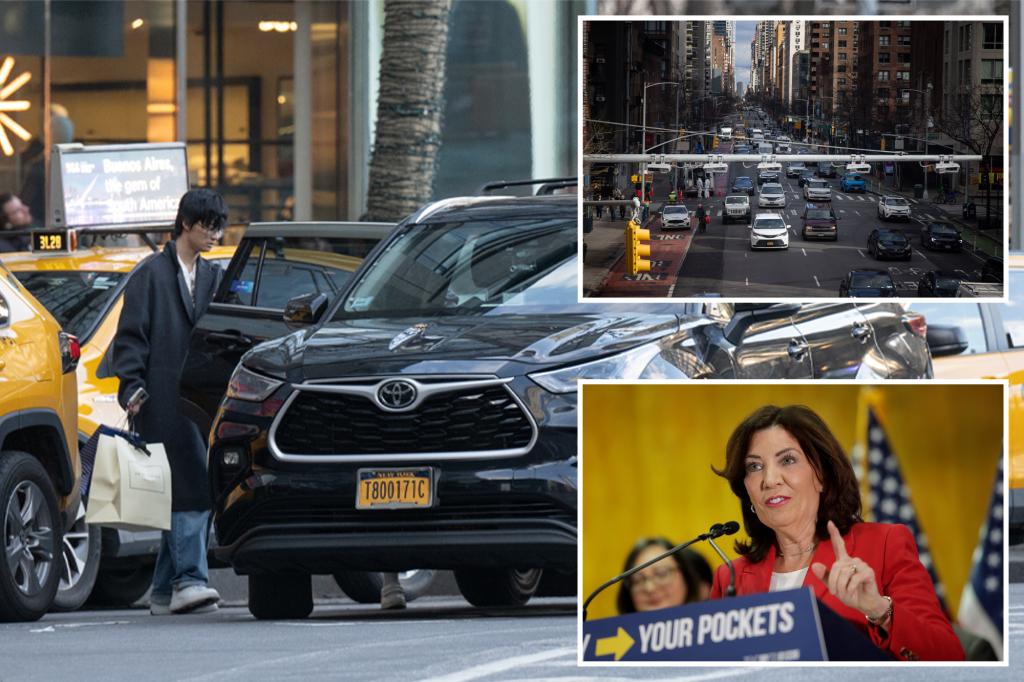Uber and Lyft poured millions of dollars into efforts to legalize congestion tolling — and they stand to be among the biggest winners.
Uber spent $2 million alone from 2015 to 2019 to promote congestion pricing, roughly $1 million of which went to some of the city’s top lobbyists, the company confirmed to The Post in 2019.
Since then, both and Uber and Lyft have continued to hire top lobbyists to help persuade key state and city officials to approve the controversial levy, including Gov. Kathy Hochul and the Metropolitan Transportation Authority, records show.
It’s unclear how much the companies spent lobbying for congestion pricing because the lobbyists hired worked on multiple issues, and officials records don’t break it down.
The ride-share companies declined to provide The Post a breakdown — or even an estimate — of its lobbying expenses.
Lyft — which also own the CitiBike program — has also directly contributed to pols who have been pushing the polarizing scheme.
Lyft poured over $125,000 into state campaigns since 2020 – including $18,500 the past four years to Hochul, who pushed it forward after a brief pause near the election, records show.
It also donated $10,000 in 2020 to then-Gov. Andrew Cuomo, who backed congestion pricing when he was in office but now wants to hit the brakes on it.
It’s been money well spent.
The growing industry — which got a huge boost last year when the city lifted a cap on how many for-hire vehicles can be on the road — stands to make a killing because the new surcharge is both cheaper than the $9 fee private vehicles will pay to enter parts of Manhattan, and the $2.90 straphangers pay to take subways and buses, critics say.
The ride-hailing services will be slapped with an additional $1.50 surcharge for Manhattan trips below 60th Street. But the additional costs will be passed on to customers — just like a similar $2.75 “congestion fee” on all trips below 96th Street authorized in 2019.
“This is corporate greed at its worst,” said Councilman Robert Holden (D-Queens), who opposes congestion tolling. “These companies will stop at nothing to rewrite the rules in their favor while leaving chaos in their wake.”
The new tolls fit “right into” Uber and Lyft’s “business model to charge a premium for access to the scarcest street — those in core Manhattan” – and its customers will benefit from faster service with less cars on the street, said Nicole Gelinas, a senior fellow at the Manhattan Institute.
“The sudden sticker shock here won’t be felt by Uber and Lyft or their passengers, but by the regular driver,” she said.
Susan Lee, one of the plaintiffs in a slew of lawsuits seeking to stop the congestion tolling, blamed the for-hire industry for “pushing” congestion tolling and flooding city streets with its roughly 100,000 vehicles — causing much of NYC’s gridlock.
“If the motivation is to incentivize people to take mass transit, then the new fee for for-hire vehicles should be equivalent to” the $2.90 cost for a bus or subway ride,” Lee said.
Josh Gold, a Uber spokesman, said the company was “early supporters of congestion pricing — and still is — but “government can’t continue to raise prices and fees on New Yorkers and expect no consequences.”
Lyft spokesman CJ Macklin said “we are supportive of congestion pricing and the positive impacts it could have on our city, but it must be done in an equitable way.”
“Our industry has already been paying a congestion fee since 2019 that has generated more than $1 billion in revenue to the MTA,” he said. “We don’t think riders should be double taxed, and we lobbied hard for them to be exempt from this new additional $1.50 congestion fee.”
Read the full article here


